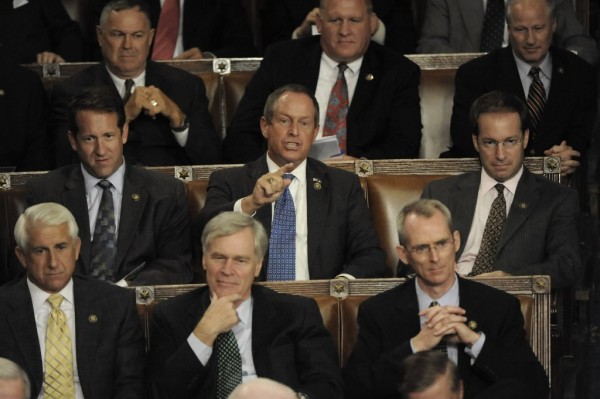America's Long History of Heckling & Outbursts

Recently on the campaign trial President Obama’s strategist, David Axelrod was heckled by Romney supporters in Boston. This turned into a controversy when Romney refused to apologize for his supporters and President Obama was subsequently interrupted during an immigration policy address, unrelated to campaign politics. By not condemning the hecklers, who are a part of his team, Romney is accused of implicitly endorsing them. Gov. Romney was quoted on the subject saying “American politics has a long history of heckling and free speech”.
Democrats are not innocent by any means with regards to interrupting speeches. Reportedly, a group of Obama supporters heckle Romney at every stop. The difference is President Obama and the Democrats outwardly condemn these "punks", even on their own side. So should heckling be condemned or supported?
It is safe to say that Romney is correct in that heckling has been present throughout American history, and over a hundred years ago it was a lot harsher than a chant or a couple of people shouting.
In 1838 there was an actual duel in the House of Representatives when Rep. William Graves of Kentucky shot and killed fellow Congressman Jonathan Cilley of Maine over words spoken on the House floor. Talk about supporting heckling, Graves wasn’t even expelled from the House for it.
Another case around 150 years ago, a congressman from South Carolina beat a senator from Massachusetts unconscious with a metal top cane in the Senate chamber. He was angered by the Massachusetts Senator’s speech on slavery.
Even Abraham Lincoln was heckled according to the Washington Post. The night before his Gettysburg address, as historian Garry Wills has recounted, Lincoln once told an unruly crowd that he didn't like speaking off the cuff because "in my position, it is somewhat important that I should not say any foolish thing." A heckler shouted back, "If you can help it."
The 1960's were an incredibly popular time for heckling. The Vietnam War, which implemented the draft system left many citizens upset. Soon whenever president Lyndon B. Johnson spoke, a chant of “Hey, Hey LBJ, how many kids did you kill today?” could be heard ringing through the crowd.
In the 1970’s, Vice President Gerald Ford was famously heckled when speaking at a graduation of his alma mater University of Michigan. Signs were held up saying, "Jerry Ford is a neofascist.”
Ford replied saying, "Those exuberant signs, actually a safe form of telegenic streaking for those who have nothing to do but expose their minds, add to the excitement of this homecoming."
In the 1980's President Reagan was heckled in one of his speeches by members of the audience shouting “Liar, liar, pants on fire!". When the heckling did not stop, Reagan apparently joked, "You know, I know I'm no concert baritone, so I know those can't be an echo in my voice."
President Bush had a shoe thrown at his head during a press conference. A common tactic for Occupy Wall Street is interrupting prominent speakers with a "People's Mic" call and return.
Romney is absolutely correct in saying America has had a long history of heckling in politics, and it has nothing to do with respect. This is how Americans operate. We like our voices to be heard.




